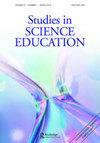教师与科学课程教材:我们在哪里,我们需要去哪里
IF 9.9
2区 教育学
Q1 EDUCATION & EDUCATIONAL RESEARCH
引用次数: 94
摘要
课程材料是科学教师的重要概念工具,更好地了解科学教师如何使用这些工具有助于改进课程设计和与教师学习和决策相关的理论。作者回顾了有关教师和科学课程教材的文献。该评估围绕三个主要问题进行:教师在使用科学课程材料时是怎么做的?当教师使用科学课程材料时会发生什么?为什么老师会做出这样的决定?对于每个问题,作者首先总结了数学教育文献中两个关键评论的发现,然后将科学教育的发现与这些发现并置。回顾发现,相对而言,人们对教师如何与课程材料互动的机制知之甚少。为了弥补这一差距,补充和扩展该领域对教师与课程关系的现有理解,作者在自我调节的文献基础上提出了四个主张。这些命题反映了教师课程决策的一种机制。自我调节的观点也有助于为科学教师提供更有针对性的支持,旨在以预期的方式吸收、适应和制定课程材料,并且教师自己也体验到教学的改进。作者最后呼吁进行研究,进一步探索科学教师个人决策的方式,这些决策是在更广泛的社会文化背景下进行的。本文章由计算机程序翻译,如有差异,请以英文原文为准。
Teachers and science curriculum materials: where we are and where we need to go
Abstract Curriculum materials serve as a key conceptual tool for science teachers, and better understanding how science teachers use these tools could help to improve both curriculum design and theory related to teacher learning and decision-making. The authors review the literature on teachers and science curriculum materials. The review is organised around three main questions: What do teachers do when using science curriculum materials?, What happens when teachers use science curriculum materials? and Why do teachers make the decisions they do? For each question, the authors first summarise the findings of two key reviews from the mathematics education literature, then situate the findings from science education in juxtaposition with those findings. The review uncovers that relatively little is understood about the mechanism underlying how teachers interact with curriculum materials. To try to address this gap, complementing and extending the field’s existing understandings of the teacher–curriculum relationship, the authors make four propositions, grounded in the literature on self-regulation. The propositions reflect a mechanism for teacher curricular decision-making. The self-regulation perspective also helps to develop more targeted support for science teachers aimed at the uptake, adaptation and enactment of curriculum materials in ways that are intended, and that teachers themselves experience as an improvement in their teaching. The authors conclude with a call for research that further explores the ways in which individual science teachers’ decision-making is situated within the wider sociocultural context.
求助全文
通过发布文献求助,成功后即可免费获取论文全文。
去求助
来源期刊

Studies in Science Education
EDUCATION, SCIENTIFIC DISCIPLINES-
CiteScore
15.30
自引率
2.00%
发文量
7
审稿时长
>12 weeks
期刊介绍:
The central aim of Studies in Science Education is to publish review articles of the highest quality which provide analytical syntheses of research into key topics and issues in science education. In addressing this aim, the Editor and Editorial Advisory Board, are guided by a commitment to:
maintaining and developing the highest standards of scholarship associated with the journal;
publishing articles from as wide a range of authors as possible, in relation both to professional background and country of origin;
publishing articles which serve both to consolidate and reflect upon existing fields of study and to promote new areas for research activity.
Studies in Science Education will be of interest to all those involved in science education including: science education researchers, doctoral and masters students; science teachers at elementary, high school and university levels; science education policy makers; science education curriculum developers and text book writers.
Articles featured in Studies in Science Education have been made available either following invitation from the Editor or through potential contributors offering pieces. Given the substantial nature of the review articles, the Editor is willing to give informal feedback on the suitability of proposals though all contributions, whether invited or not, are subject to full peer review. A limited number of books of special interest and concern to those involved in science education are normally reviewed in each volume.
 求助内容:
求助内容: 应助结果提醒方式:
应助结果提醒方式:


